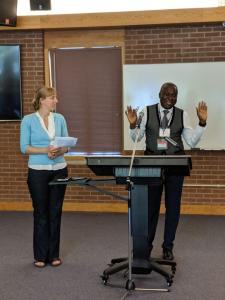Statement of Affirmations and Commitments from “Power and Preservation” Symposium

As historians, archivists, and church and mission leaders from around the world, we gathered in Goshen, Indiana (USA), from June 17-19, 2019 for a symposium convened by the Institute for the Study of Global Anabaptism. Together for the first time, we gained a new recognition of each other as allies in the effort of preserving the sources behind our stories.
As a group, we affirm the following:
- As followers of Jesus Christ our history connects us, reminds us of the Spirit’s activity among us, and calls us forward into the future.
- The task of telling and preserving our stories is urgent because of the deterioration of records and the loss of oral memory.
- We share rich resources: a deep commitment, vision, and desire to promote preservation and access; a wide variety of technical skills and expertise; imagination and creativity; broad networks and established relationships; individual spheres of influence; records, stories and experienced storytellers; human, institutional, and financial resources
- Archives play a crucial role in helping us to understand the inseparability of the stories of church and mission.
- Equitable access to sources is necessary because we share the ownership of our stories. We recognize the various significant barriers to preservation and access: borders; financial constraints; language; limited skills in preparation and the management of historical resources; lack of information; difficulty of international collaboration; restrictions on access by those in power; institutional weaknesses and lack of commitment
We commit to the following:
- To foster habits of preservation throughout the global Anabaptist-Mennonite community.
- To look for new ways to deepen our collaboration across continents.
- To engage in new and continued efforts to preserve sources and to promote access.
- To nurture enthusiasm within our communities for the tasks of collecting sources and sharing stories.
- To make space for diverse narratives that are well-researched, well-sourced, and justly told.
- To mitigate the barriers of language.
- To encourage our leaders to dedicate resources for institutional support for this task.
- To encourage the continued writing, rewriting, and publishing of the history of the church.
We call on our leaders to support us in these commitments.




